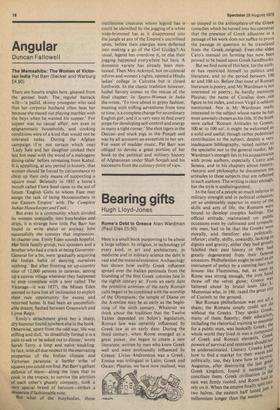Bearing gifts
Hugh Lloyd-Jones
Rome's Debt to Greece Alan Wardman (Paul Elek £5.50)
Here is a small book purporting to be about a large subject. In religion, in technology of every kind, in art and architecture, in medicine and in military science the debt is vast and the material extensive. Archaeology has shown how swiftly Greek influence spread over the Italian peninsula from the founding of the first Greek colonies late in the eighth century BC. From an early date the primitive animism of the early Roman cults began to be combined with the worship of the Olympians; the temple of Diana on the Aventine may be as early as the beginning of the sixth century. Whatever we think about the tradition that the Twelve Tables depended on Solon's legislation, Roman law was certainly influenced by Greek law at an early date. During the third century, when Rome emerged as a great power, she began to create a new literature, written by men who knew Greek well and were profoundly influenced by Greece. Livius Andronicus was a Greek; Ennius was trilingual in Latin, Greek and Oscan; Plautus, we have now realised, was
so steeped in the atmosphere of the Greek comedies which he turned into his operettas that the presence of Greek allusions in a passage of his work does not suffice to prove the passage in question to be translated from the Greek original. Even the elder Cato's manual on farming has now been proved to be based upon Greek handbooks.
But we find none of this here, for the author has restricted himself to politics and
literature, and to the period between 100 BC and 100 AD. Before that most of Roman literature is poetry, and Mr Wardman is not interested in poetry; he hardly mentions Plautus, the name of Catullus does not figure in his index, and even Virgil is seldom mentioned. Nor is Mr Wardman really interested in the subject whose name he has most unwisely chosen as his title. If the book were called 'Roman Attitudes to Greece. 100 BC to WO AD', it might be welcomed as a solid and useful, though rather pedestrian contribution to the subject, despite a very inadequate bibliography, suited neither to the specialist nor to the general reader, Mr Wardman's strength lies in his acquaintance with prose authors, especially Cicero and Seneca, and in his chapters about history, rhetoric and philosophy he documents the attitudes to these subjects that are reflected in such authors. The writing is clear enough. but the style is undistinguished. In the face of a people so much inferior in military strength and in political cohesion. yet so undeniably superior in many of the skills and arts of life, the Romans were bound to develop complex feelings. The official attitude, maintained on publii, occasions even by cultivated and sYmpath. etic men, had to be that the Greeks were morally, and therefore also politically. inferior; crafty, shifty, cowardly, lacking In dignity and gravity, either they had grossly falsified their past history or they hact greatly degenerated from their famous ancestors. Philhellenism might be used as an instrument of policy by a cunning faux bon homme like Flamininus, but, as 50011 as Rome was strong enough, the iron hand threw off the velvet glove; Greece wa.s battered about by brutal louts like .1-Mummius who, in 146, razed the great cltY of Corinth to the ground. But Roman philhellenism was not all 3 t do
sham; the Romans simply could no
without the Greeks. They spoke Gree:' many of them fluently; their educatlr; including the rhetorical training so essent, for a public man, was basically Greek, "cl whole world they lived in was a comPounk of Greek and Roman elements. Gree powers of survival and resistance should 11 be underestimated. Literary Greeks knae_ci how to find a market for their waresv,1%;_. politically, too, they knew how to sur great Augustus, after destroying the last g ,0 Greek kingdom, found it necessaTY „.`e conciliate them. Greek civilisation In in east was firmly rooted, and Rome n,ac.I ,t0° rely on it. When the empire finally spht two halves, the eastern half lasted ill
stern. millennium longer than the we


























 Previous page
Previous page